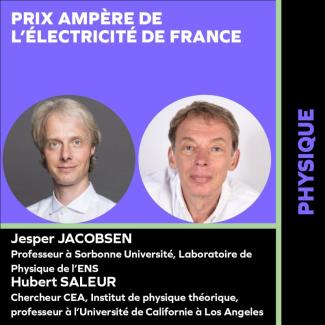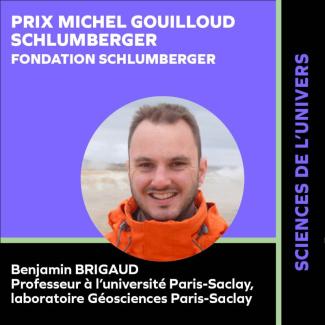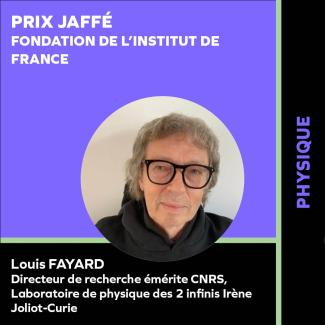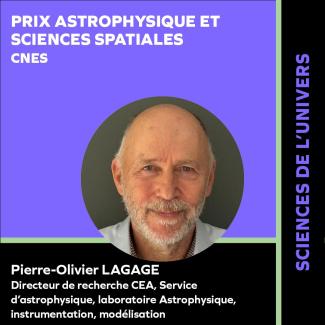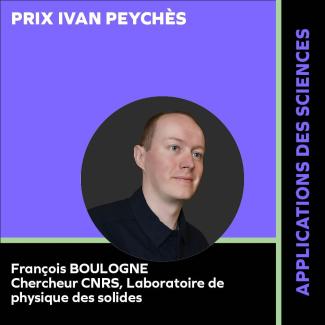
Five scientists affiliated with Université Paris-Saclay awarded by the French Academy of Sciences in 2025
On Tuesday, 28 October, the French Academy of Sciences awarded its annual medals and prizes to researchers in both fundamental and applied sciences. This year, five scientists from the Université Paris-Saclay community were recognised for their outstanding work.
Ampère Prize for Electricity of France – Hubert Saleur
Hubert Saleur, a researcher at the CEA - Institute of Theoretical Physics (DRF/IPhT - Univ. Paris-Saclay/CEA/CNRS) and a professor at the University of California, Los Angeles (UCLA), studies physical problems in regimes of strong interactions or out-of-equilibrium systems by elucidating and exploiting the mathematical structures (such as generalized symmetries) of quantum field theory. His research focuses particularly on critical phenomena, mesoscopic systems, quantum electronics, and geometric statistical problems.
The Ampère Prize for Electricity of France is an annual award of €50,000, established by Électricité de France in honour of the great scientist André-Marie Ampère, whose 200th birthday was celebrated in 1975. It is intended to recognise one or more scientists working in a French laboratory for outstanding research in the fields of mathematical or physical sciences, whether fundamental or applied.
Michel Gouilloud Schlumberger Prize of the Schlumberger Foundation – Benjamin Brigaud
Benjamin Brigaud, a professor at Université Paris-Saclay and a researcher at the Géosciences Paris-Saclay Laboratory (Geops – Univ. Paris-Saclay/CNRS), is a specialist in sedimentology. His teaching and research focus on the geology of sedimentary basins. His work aims to reconstruct the geological history of basins by tracing the evolution of paleo-environments and dating minerals. He also studies how to optimise the use of sedimentary rocks as reservoirs for geothermal energy and how to develop new applications for basins, including energy storage and natural hydrogen.
Established in 2001, the Michel Gouilloud Schlumberger Prize of the Schlumberger Foundation (€20,000) was created by Schlumberger to honour the memory and work of Michel Gouilloud. This annual prize is awarded to a researcher or engineer under the age of 45 on 1 January of the award year, in recognition of a significant discovery made before the age of 35 in the field of Earth sciences (geology or geophysics). The laureate is expected to have distinguished themselves through the originality of their core ideas and the applied nature of their work, particularly in relation to the research, exploitation, and use of fossil resources.
Jaffé Prize of the Fondation de l’Institut de France – Louis Fayard
Louis Fayard, Emeritus Research Director at CNRS in the Laboratory of Physics of the Two Infinities Irène Joliot-Curie (IJCLab - Univ. Paris-Saclay/CNRS/Univ. Paris-Cité), has participated in several CERN experiments. He was first involved in UA2, studying jets, contributing to the discovery of the W and Z bosons, and performing the first measurement of the W boson mass. He then worked on NA48, leading to the discovery of direct CP violation in neutral kaons, and finally on ATLAS, where he contributed to the discovery of the Higgs boson and the measurement of its properties, particularly its mass.
The funds of this foundation, established in 1930 (€6,850), are used to award a prize recognising experiments in the field of physics aimed at the progress and well-being of humanity.
Astrophysics and Space Sciences Prize – Pierre-Olivier Lagage
Pierre-Olivier Lagage, Research Director at CEA in the Astrophysics Department of the Astrophysics, Instrumentation, Modelling Laboratory (AIM - Univ. Paris-Saclay/CEA/CNRS/Univ. Paris-Cité), specialises in the observation of the cosmos in the infrared domain following a theoretical PhD on cosmic ray acceleration. He is the French scientific lead for the development of several innovative instruments for both ground-based and space telescopes, notably for the MIRI instrument of the James Webb Space Telescope (JWST), with which he studies the atmospheres of exoplanets.
The Astrophysics and Space Sciences Prize is an annual award (€10,000), established in 2017, intended to recognise researchers of any nationality (or teams of researchers) working in a French laboratory for outstanding work in astrophysics, not limited to research involving space-based techniques.
Ivan Peychès Prize – François Boulogne
François Boulogne, a CNRS researcher at the Laboratory of Solid-State Physics (LPS - Univ. Paris-Saclay/CNRS), studies phase transitions in soft matter, focusing in particular on evaporation in fibrous media and soap-based objects, morphogenesis during solidification, and the friction of liquid foams on rough surfaces. His research combines experimentation and modelling, aiming to understand the underlying physical phenomena and their industrial applications.
The Ivan Peychès Prize is an annual award (€3,000), established in 1989, recognising applied scientific work in the field of glassy state structures or in the use of solar energy, or, if not, in related fields, provided the work is of an applied science nature.

